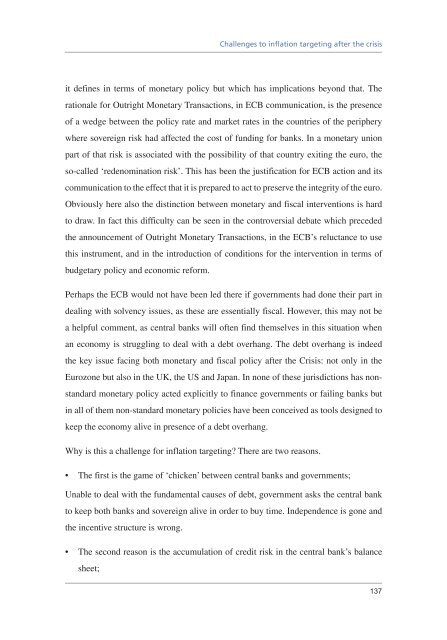Is inflation targeting dead? Central Banking After the Crisis - Vox
Is inflation targeting dead? Central Banking After the Crisis - Vox
Is inflation targeting dead? Central Banking After the Crisis - Vox
Create successful ePaper yourself
Turn your PDF publications into a flip-book with our unique Google optimized e-Paper software.
Challenges to <strong>inflation</strong> <strong>targeting</strong> after <strong>the</strong> crisisit defines in terms of monetary policy but which has implications beyond that. Therationale for Outright Monetary Transactions, in ECB communication, is <strong>the</strong> presenceof a wedge between <strong>the</strong> policy rate and market rates in <strong>the</strong> countries of <strong>the</strong> peripherywhere sovereign risk had affected <strong>the</strong> cost of funding for banks. In a monetary unionpart of that risk is associated with <strong>the</strong> possibility of that country exiting <strong>the</strong> euro, <strong>the</strong>so-called ‘redenomination risk’. This has been <strong>the</strong> justification for ECB action and itscommunication to <strong>the</strong> effect that it is prepared to act to preserve <strong>the</strong> integrity of <strong>the</strong> euro.Obviously here also <strong>the</strong> distinction between monetary and fiscal interventions is hardto draw. In fact this difficulty can be seen in <strong>the</strong> controversial debate which preceded<strong>the</strong> announcement of Outright Monetary Transactions, in <strong>the</strong> ECB’s reluctance to usethis instrument, and in <strong>the</strong> introduction of conditions for <strong>the</strong> intervention in terms ofbudgetary policy and economic reform.Perhaps <strong>the</strong> ECB would not have been led <strong>the</strong>re if governments had done <strong>the</strong>ir part indealing with solvency issues, as <strong>the</strong>se are essentially fiscal. However, this may not bea helpful comment, as central banks will often find <strong>the</strong>mselves in this situation whenan economy is struggling to deal with a debt overhang. The debt overhang is indeed<strong>the</strong> key issue facing both monetary and fiscal policy after <strong>the</strong> <strong>Crisis</strong>: not only in <strong>the</strong>Eurozone but also in <strong>the</strong> UK, <strong>the</strong> US and Japan. In none of <strong>the</strong>se jurisdictions has nonstandardmonetary policy acted explicitly to finance governments or failing banks butin all of <strong>the</strong>m non-standard monetary policies have been conceived as tools designed tokeep <strong>the</strong> economy alive in presence of a debt overhang.Why is this a challenge for <strong>inflation</strong> <strong>targeting</strong>? There are two reasons.• The first is <strong>the</strong> game of ‘chicken’ between central banks and governments;Unable to deal with <strong>the</strong> fundamental causes of debt, government asks <strong>the</strong> central bankto keep both banks and sovereign alive in order to buy time. Independence is gone and<strong>the</strong> incentive structure is wrong.• The second reason is <strong>the</strong> accumulation of credit risk in <strong>the</strong> central bank’s balancesheet;137














